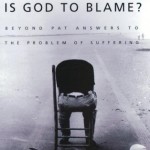We run our website the way we wished the whole internet worked: we provide high quality original content with no ads. We are funded solely by your direct support. Please consider supporting this project.

4 Reasons to Wake Up to the Warfare Worldview
Image by postbear via Flickr
A view of the world that grounds the problem of evil in spiritual warfare is not one that many modern people find easy to accept. To many contemporaries, the notion is preposterous that real, semi-autonomous, self-determining, and invisible spirits exist that can and do influence our lives. The whole thing sounds to them more like something out of a Star Wars movie than like serious contemporary theology.
Our perspective of the world has been colored by materialistic presuppositions, and this, up until recently, has been leaving less and less room for a belief in such things as angels and demons.
Outside of the fact that the Bible makes it clear that there is a real spiritual war transpiring, there are four reasons why we are poised to wake up to the reality of the warfare worldview:
- The Move Beyond Materialistic Assumptions. The dominance of the Enlightenment rationalistic and naturalistic assumptions concerning the nature of reality and the means by which we know it is rapidly waning. There is now an increasing openness to, if not explicit awareness of, “nonordinary reality.” We are becoming aware that the Western materialistic worldview is (as all worldviews to some extent are) a social construct. It is a construct that seems to have in part evolved precisely to censor out all aspects of reality that are not manageable by empirical techniques. But it thereby blinded us to those dimensions of reality that were beyond our control, including the world of the Spirit.
But this is changing. There is now an increasing appreciation for and validation of the “commonsense” assumption of nearly every culture outside our own that the world is not simply physical. Western culture is in many respects beginning to relearn what many primitive people have, in however a distorted form, never forgotten: The cosmos is a veritable society of intelligent interacting beings, some of whom are not physical.
- The Church’s Experience of Spiritual Warfare. Over the last 4 decades, we have witnessed major segments of the Western church abandoning wholesale their previous modernistic mindset, which held that spiritual warfare was at best peripheral to the life of the church. The overall result of this new spiritual climate is that the parameters of what many Western believers have previously regarded as being “normal” Christianity are being stretched. This is a positive development. It means that the climate is ripe for a restoration of a NT model of the church as the supernaturally empowered body of Christ that carries on the work which the Son began.
- The Questioning of the Classical View of Diety. We are now living in an age in which the classical views of God—that is, unmoved, impassible, immutable, nontemporal, and purely actual—are becoming less and less persuasive, if not altogether unintelligible, to people in Western culture. The notion that “divine perfection” necessarily implies changelessness, atemporality, pure actuality and impassibility is, at least in some quarters, no longer taken as self-evident. This rethinking of the nature of God provides greater opportunities to investigate whether these attributes are really biblical. The more these attributes are questioned, the more we can understand God and his relationship to the world to include the sort of contingency, openness and risk that is essential to a genuine warfare perspective of the world.
- The Experience of the Demonic. Arguably, never before has humanity as a whole experienced the amount, the depth and the intensity of evil that we experienced in the twentieth century. This reality has to affect our understanding of the reality of the spiritual battle. It makes simple answers and reassuring clichés harder to swallow. Consider the Holocaust. The depth of the evil despoils the myth of the divine blueprint, where we can presume that God controls everything. It can be rendered intelligible only by the category of the demonic.
I am convinced that our Western culture, and especially the Western church, is positioned to reconsider the warfare worldview of the NT and the early church—even through it runs contrary to certain fundamental aspect of both the Western church’s classical theological assumptions as well as our culture’s naturalistic orientation.
Category: General
Tags: Culture, Demons, Evil, Satan, Spiritual Warfare, Warfare Worldview, Western Assumptions
Topics: Spiritual Warfare, Cosmic Conflict
Related Reading

Resignation to Evil: Not an Option
One lucky guy via Compfight While few Christians would deny that Satan is in some sense the ruler of this world, since it’s so clearly taught in the New Testament, many nevertheless insist that everything Satan and every other free agent does fits into a divine plan that is governing every detail of world history.…

When Free Will Meets Unfathomable Evil
In the face of tragedy Christians unfortunately tend to recite clichés that attempt to reassure people that, however terrible things seem, everything is unfolding according to God’s mysterious plan. We hear that “God has his reasons”; “God’s ways are not our ways”; “God is still on his throne”; “God doesn’t make mistakes,” and things of…

Podcast: Can Satan Heal People?
Greg considers whether Satan has the ability to heal people. http://traffic.libsyn.com/askgregboyd/Episode_0268.mp3

Quotes to Chew On: Prayer and Finitude
“We pray as we live: in a sea of ambiguity. This is not because we are fallen but because we are finite. And we are inclined to forget we are finite. We ignore the ambiguity that accompanies our finitude, and thus we claim to know what we can’t know. We reduce the unfathomable complexity of…

God’s Aikido Way of Defeating Evil
Greg continues his thoughts on the atonement with this installment highlighting the way God uses the evil intentions and actions of his enemies to bring about good. And because this strategy is based in love, the demons who encountered Christ could not possibly imagine what he was up to. They ended up participating in their…

Podcast: Does God Love Satan?
Greg talks about the potential of Satan repenting. A great question by Matthew! http://traffic.libsyn.com/askgregboyd/Episode_0412.mp3
